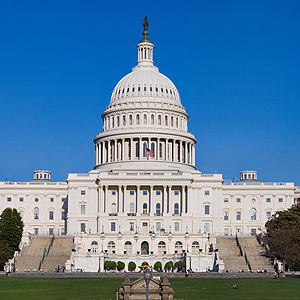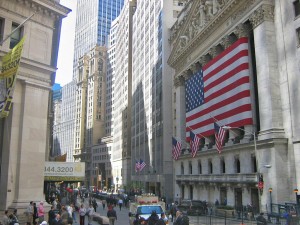
If one were to combine elements of Franz Kafka’s unfinished novel The Castle, Edward Albee’s Zoo Story and the Spanish Inquisition, one would have the recent congressional hearings on alleged malfeasance by Wall Street investment firms. The persecutory behavior and theatrics displayed by a number of Senate inquisitors were matched only by their appalling ignorance of basic finance. At the same time, the investment bankers being questioned hardly redeemed themselves, nervously offering up vague and obtuse answers, stuttering and stammering throughout. Goldman Sachs CEO Lloyd Blankfein’s interchange with Senator Carl Levin was especially uncomfortable to watch.
Given the public’s low opinion of both Congress and Wall Street, it is understandable that elected representatives are eager to score points with the folks back home by skewering big bad Wall Street bankers. However, what the public should know, needs to know, is that the federal government—not Wall Street—is the principal culprit in the financial crisis whose seeds were sown well before the fall of 2008, and that Goldman Sachs has not committed any financial felony.
It is unfortunate and unfair that Congress, the White House and the SEC find it politically expedient to target Goldman Sachs as their whipping boy to push a financial reform bill through the Senate. Goldman Sachs is no Lehman Brothers with its infamous accounting trickery, Repo 105 and other risky business that brought about its demise. Even the SEC’s case against Goldman is no slam-dunk, since its five-member commission split 3-2 on whether to proceed. And the case? That Goldman Sachs deceived ACA Capital Management by selling them a financial instrument akin to a futures contract that Goldman knew would tank. ACA and German bank IKB lost millions. The truth, however, is that Goldman bought the instrument (a synthetic CDO) itself and lost $90 million; and it was the client—ACA—that helped select and approve the portfolio it invested in! Goldman Sachs is accused by ACA of not have informed them of who was on the other side of the deal; yet, it is normal business practice for market makers not to disclose to buyers and sellers who the other party is.

The subprime mortgage debacle and financial meltdown must be evaluated within the historical context of catalytic events between 1998 and 2004. These included the bailout of Long Term Capital Management by the Greenspan Fed, leading to big-time moral hazard with the mantra “too big to fail”; the repeal of the Depression-era Glass-Steagall Act, thereby tearing down the wall between commercial and investment bank activities; and the SEC’s loosening of net capital requirements for investment banks from 12 to 1 to dangerous risk levels of 30 to 1. Additionally, the Community Reinvestment Act which bullied banks to provide home loans to low-income borrowers and a relaxation of mortgage guarantee standards at Fannie Mae and Freddie Mac (a price exacted upon them in the wake of their accounting scandals in 2003-2004) fueled a proliferation of subprime mortgages extended to unqualified borrowers. However, the federal government’s two greatest blunders in contributing to the mortgage and financial blow-up were the Fed’s maintenance of interest rates way too low for too long, thereby inflating the real estate bubble and the exemption of financial derivatives from regulation by the Community Futures Modernization Act of 2000.
Goldman Sachs and other Wall Street firms are not to blame for bi-partisan congressional irresponsibility. Are Wall Street firms innocent bystanders who have always traveled down the path of virtue and pristine ethics? Of course not; however, instead of scapegoating and grandstanding, the federal government should pass sound reforms with regulations that protect the financial system and the public while not stifling risk, entrepreneurship and American competitiveness. Derivatives should be preserved but made transparent and traded on an exchange, Glass-Steagall should be reinstated, net capital requirements for leveraging must be increased and mortgage lending criteria must be stiffer. Rating agencies’ incestuous relationship with investment banks should be terminated through third-party oversight. Consumers who borrow and invest must be better informed about terms and risks associated with financial decisions. Anything less will invite another mega-crisis at a future date.
Jerry Haar is a professor of management and international business and an associate dean at FIU’s College of Business Administration. The opinions expressed in this column are the writer’s and do not necessarily reflect the views or opinions of either FIU or the College of Business Administration.
View all articles by Jerry Haar.




